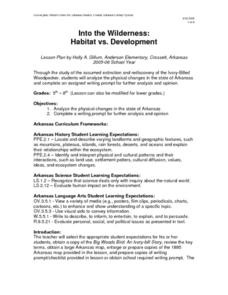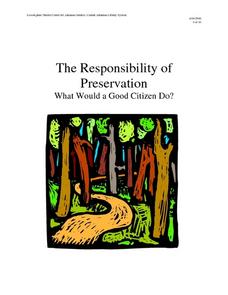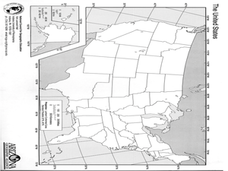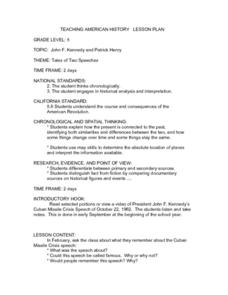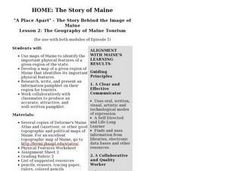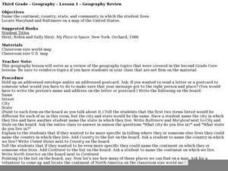Curated OER
Food For Thought: A Geography of Minnesota Agriculture
Students participate in hands-on activities and discussions about Minnesota's agriculture. They practice reading maps and locating where certain agricultural products are found throughout the state.
Echoes & Reflections
The Children and Legacies Beyond the Holocaust
Using video testimony, primary source documents that detail international agreements, and structured discussions, learners consider the precarious position of children during the Holocaust and other international conflicts, and how to...
Echoes & Reflections
Rescuers and Non-Jewish Resistance
What does it mean to be a rescuer during the time of the Holocaust? Learners consider the role of those who resisted the Nazi invasions, including hiding Jewish people, throughout Europe. Activities include listening to the testimony of...
Echoes & Reflections
Survivors and Liberators
The end was just the beginning. The period immediately after the end of World War II and the Holocaust is often called "The Return to Life" as survivors looked to reunite and recreate broken families and shattered lives. A two-lesson...
Echoes & Reflections
Jewish Resistance
Resistance to the Holocaust took on many forms. Learners explore the passive and active resistance of Jewish people who continued their practices and observances, as well as organized resistance against the evils of the Nazis. An...
Curated OER
Into the Wilderness: Habitat vs. Development
By studying the once-assumed extinction, then rediscovery of the Ivory-Billed Woodpecker, learners look at the physical changes that have occured in habitats throughout Arkansas. This outstanding lesson is chock full of terrific...
Echoes & Reflections
The Ghettos
Young historians examine primary sources, including diaries, poems, and photographs, to consider the conditions in the ghettos and how they fit into the escalation of the Third Reich's plot against the Jewish people.
Echoes & Reflections
Studying The Holocaust
While many young scholars are familiar with the Holocaust, they may not understand the specific history that led to the unprecedented atrocity. The first lesson in the unit helps teachers gauge their pupils' background knowledge. A...
Curated OER
Native Americans in Arkansas: The Quapaw
The Quapaw Indians of Arkansas are the focus of this American history lesson. Learners discover many aspects of the Quapaw culture, such as their dwellings, social organization, food, and how the tribe was eventually driven out of...
Curated OER
The Responsibility of Preservation
Upper elementary and middle schoolers study the case of the ivory-billed woodpecker, a bird that was once-thought to be extinct. Learners explore the responsibility of people to preserve habitats, and take care of the animals who live in...
Curated OER
Poverty Point: A Louisiana Treasure
A well-done and informative presentation, this resource could be used to pique interest in Lousiana's history. This presentation about Poverty Point, a mound created by Native Americans, is a fascinating exploration of this topic. What...
Curated OER
How Can We Locate Specific Places On Earth?
Second graders discover how to use longitude and latitude to locate specific sites on Earth. They compare old and new ways of locating specific places, and discover how latitude and longitude coordinates are used to locate places on Earth.
Curated OER
1862 MARYLAND CAMPAIGN, AMERICAN CIVIL WAR
Students explain why General Robert E. Lee decided to invade Maryland in September 1862; review the major events of the Maryland Campaign of 1862; describe the major events of the three phases of the Battle of Antietam; and assess the...
Curated OER
Past and Present
Students identify George Washington on the obverse of the quarter and read about George Washingington. They compare Washington to the current president and practice distinguishing between events in the past and the present.
Curated OER
The Displacement of the Native Americans
Seventh graders comprehend the interaction and conflict between Native Americans and white settlers in the years following the Civil War. They examine how those conflicts impacted the Native American way of life on the Great Plains.
Curated OER
Route 66 And Population Patterns
Students investigate the geography located along Route 66. They research how the population patterns change in certain areas along the highway. Students use the information in order to form hypotheses about how and why the population...
Curated OER
Tale of Two Speeches
Students view and read portions of John F. Kennedy's Cuban Missile Crisis speech from October 22, 1962. Later in the year, students recall what they remember about the speech and use a Venn Diagram to compare it to Patrick Henry's...
Curated OER
Get Ready for the Great Outdoors!
Learners discuss what is a map and what they already know about maps. They brainstorm together to compile a list of responses for the board and observe a map of the United States, including states, capitals, and some of the National Parks.
Curated OER
The Shape of Arkansas
Students are shown a United States map and learn the location and shape of Arkansas. They take a map home for their family to help them locate close family members across the United States.
Curated OER
Where in the Usa is Radon?
Students determine the areas of New Jersey and the US that are likely to have high radon concentrations. Students draw a map of their own neighborhood that show soil associations in their neighborhood.
Curated OER
Somewhere in Indiana
Second graders locate the United States, Indiana, their community, and their neighborhood community on a map, and a world globe 4 out of 5 times correctly. They then discuss what they have learned in the lesson.
Curated OER
The Geography of Maine Tourism
Students study topographical maps of Maine to identify the important physical features. They work in groups to create tourism pamphlet highlighting a region of the state.
Curated OER
Heavy Breathing
Pupils investigate asthma and air quality, and then map or graph the incidence of asthma by county and air quality information by county in the state of Maryland. They attempt to see any correlations and note any limitations of the data.
Curated OER
Geography Review
Third graders name the continent, country, state, and community in which they live. They locate Maryland and Baltimore on a map of the United States.







